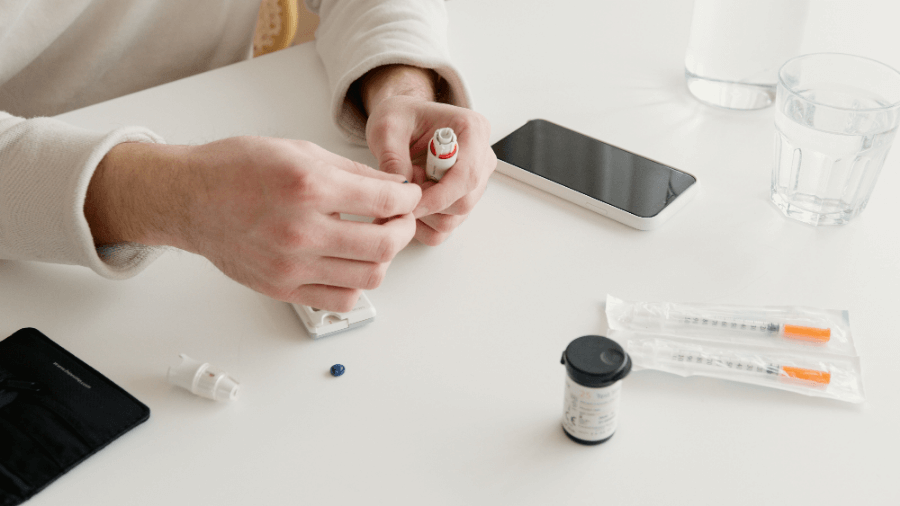Good Fats, Bad Fats ! Facts about Hyperlipidaemia

What causes high cholesterol?
Your liver produces cholesterol, but you also get cholesterol from food. Eating too many foods that are high in animal fats can increase your cholesterol level. Being overweight and inactive also causes high cholesterol. If you are overweight, you most likely have a higher level of triglycerides. Your family history also affects your cholesterol level. Research has shown that high cholesterol tends to run in families. If you have an immediate family member who has it, you could have it, too.
What is hyperlipidaemia? (Good Fats, Bad Fats)
Lipids are fatty substances in our bodies which play an important role in all living cells. These include cholesterol, triglycerides, phospholipids and fatty acids. Low-density lipoprotein (LDL) is known as the “bad” fats. It has the tendency to deposit onto the walls of the blood vessels, leading to formation of atherosclerotic plaques. Lowering the level of LDL-cholesterol can reduce our risk of coronary heart disease and stroke. The high-density lipoprotein (HDL) carries excess cholesterol from the different parts of the body to the liver and is therefore known as the “good” cholesterol. High levels of HDL-cholesterol may help to reduce our risk of heart disease or stroke.
Types of hyperlipidaemia
1. Hypercholesterolemia – Total Cholesterol and LDL ↑
2. Mixed hyerlipidaemia – Total Cholesterol, LDL and Triglyceride ↑
3. Hypertriglyceridemia – Triglyceride ↑ (1.7-4.5mmol/L)
4. Severe Hypertriglyceridemia – Triglyceride ↑↑ (>4.5mmol/L)
What risk are associated with hyperlipidaemia?
Hyperlipidaemia is one of the most important modifiable risk factor for Coronary Artery Disease (CAD) and stroke. CAD is the 2nd commonest cause of death in Singapore. Other risks associated are stroke, diabetes, hypertension and metabolic syndrome.
Risk Factors for CAD
Non modifiable
1. A family history of familial hyperlipidaemia
2. A family history of cardiovascular disease before age 50years in male relatives and before age 60years in female.
Modifiable
1. Diabetes Mellitus
2. Smoking
3. High blood pressure
4. Obesity
5. Hyperlipidaemia
How do I know if I have high cholesterol? Are there any symptoms?
There are no specific symptoms of high cholesterol. Too much cholesterol in the blood causes a build up of fatty deposits on the inside walls of the blood vessels (atherosclerotic plaques). This results in blockage of blood vessels and reduction of blood flow. When this happens, blockage of the coronary arteries can result in a heart attack and if it occurs in the brain, the person will suffer a stroke.
Men and women aged 40 years and above should be routinely screened for lipids. Testing is done through a blood sample taken after 10-12hours of fasting. The lipid profile should include TC, TG, LDL and HDL cholesterol.
How do I manage my high cholesterol?
Make healthy food choices (wholegrain foods, vegetables, fruits, legumes, nuts, fish and unsaturated oils) and avoid eating food containing trans-fats and saturated fats. Other lifestyle changes include stopping smoking, weight reduction through diet modification and exercise. Try to reduce BMI to less than 23kg/m2. Exercises should include moderate intensity aerobic activity lasting 150-300mins spread over 5-7 days per week. However if a person’s cholesterol cannot be controlled by lifestyle changes alone medication can be added. The intensity of risk reduction therapy is adjusted to individual’s risk of developing coronary artery disease.
Types of Medication

1. Statins – 1st line for hypercholesterolaemia and mixed hyperlipidaemia. The approximate equipotency of the commonly prescribed statins is as follows – 20mg simvastatin = 5mg rosuvastatin = 10mg atorvastatin
2. Fibrates – fenofibrate, gemfibrozil for use in hypertriglyceridemia
3. Ezetimibe – can be used as an add on or when patients are intolerant or allergic to statins
4. Niacin
5.Omega 3 fish oils – as an add on in doses of 3-12 gram per day for treatment of severe hypertriglyeridemia not managed by fibrates
Side Effects and Monitoring
1. Prior to starting statins, measure baseline AST, ALT , CK. These levels should be monitored during statin treatment especially if patients are symptomatic.
2. Myopathy and rhabdomyolysis- inform patients with muscle symptoms of pain, tenderness, cramping and weakness to alert their doctor. This occur more commonly in the elderly or in patients with impaired renal function.
3. Close monitoring of blood sugar in diabetics is recommended upon initiation of statin
Do I have to be on medication long term?
Many patients think that once they have started on medication to control their cholesterol levels, they are unable to stop. Statins if taken regularly have been shown to be effective in lowering cholesterol levels. Patients who like to stop medication after target levels have been achieved should do so with guidance from their doctors. Benefits of continuation, costs and side effects should be discussed.
Do health supplements and traditional Chinese medication help to reduce my cholesterol levels?
The long term effects of traditional medication and health supplements have not been extensively researched. Furthermore side effects from these alternative treatments are also not known.
For further enquiries, do contact your nearest Frontier Healthcare clinic to arrange for a health screen and consult.
TC – Total Cholesterol
LDL – Low-Density Lipoprotein
HDL – High-Density Lipoprotein
TG – Triglyceride
AST – Aspartate Transaminase
ALT – Alanine Transaminase
CK – Creatine Kinase
References:
1. MOH clinical practice guidelines 2016- Lipids
3. American Academy of Family Physicians – patient information on lipids
Frontier Medical Associates (Ubi)
About Frontier Healthcare Group
Frontier Healthcare (as part of the Qualitas Primary Care Division) runs 18 GP clinics, 2 Family Medicine Clinics (Clementi and MacPherson) and has 37 affiliated GP clinics under its Frontier Primary Care Network Program. Frontier Healthcare supports national schemes such as the Community Health Assist Scheme (Pioneer, Merdeka, CHAS Green, CHAS Orange, CHAS Blue), Baby Bonus, Healthier SG, MBS@Gov etc, as well as partnerships with major Insurers, Corporates and TPA partners to bring quality and affordable healthcare closer to the community.


 Login
Login
 Download App
Download App 






